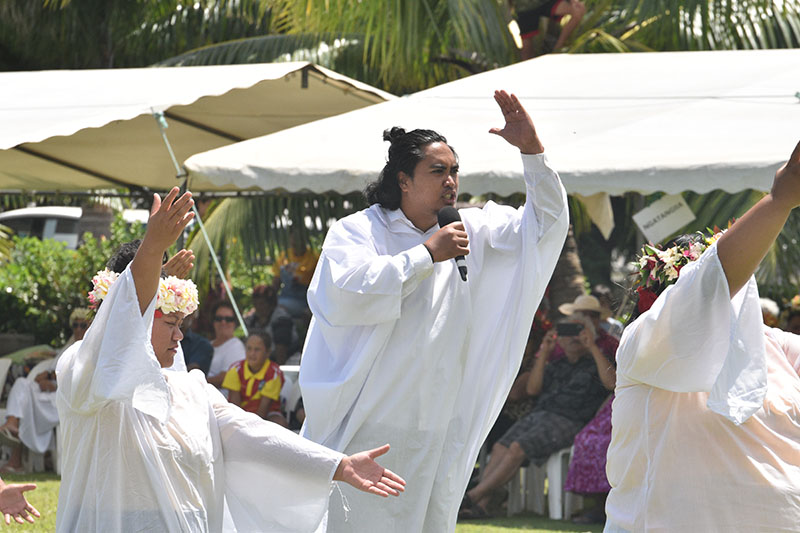CHURCH TALK: Accepting the Almighty God
Friday 29 October 2021 | Written by Supplied | Published in Church Talk, Features

The 2021 Gospel Day was held at the Takamoa Theological grounds. This year’s event will
be hosted by the Arorangi Cook Islands Christian Church (CICC) at Raemaru Park tomorrow starting from 10am. 21102610
This week earmarked a memorable time in our Cook Islands history to celebrate and reflect upon the arrival of Christianity to our shores 200 years ago, writes Reverend Vakaroto Ngaro of Ekalesia Avarua.
For the Son of Man has come to seek and to save that which was lost (Luke 19:10). An exposition of the Gospel message which had transformed lives out of heathenism, cannibalism, tribal wars and disputes which reflected upon the light of Christianity being introduced to our shores. This week earmarked a memorable time in our Cook Islands history to celebrate and reflect upon the arrival of Christianity to our shores 200 years ago.
Two Tahitian deacons, Papehia and Vahapata, together with John Williams boarded the Westmooreland, a whaling vessel, bound for Australia, and made the epic journey to the island of Aitutaki.
They arrived in Aitutaki on the October 26, 1821. These were great men in the history of Cook Islands Mission due to their industrious endeavour, hard work with great dedication to the mission work.
Upon their arrival they dropped anchor just off the reef, while the natives were yelling loudly.
Some of them were tattooed from the head to the toe, some were covered with red and yellow clay, and some were darkened with charcoal.
It was a sight never to be ignored as the first response to the arrival of Christianity to Araura.
According the “Te Karere (Messenger) 1899, No. 10, October, Mangaia”, the chief in Aitutaki managed to go onboard and conversed with the Tahitian missionaries.
He was asked to accept these men as life savers for the people, bringing the gospel of Jesus Christ to them.
The chief accepted the request and he took with him the two Tahitian missionaries, Papehia and Vahapata ashore as their prize.
These two men laboured hard in Aitutaki, spreading the good news.
They didn’t have much problem with the language, as they could understand each other and their culture, which was similar to what they had in Raiatea.
Some of the natives of Aitutaki also tried to convince the people not to believe them. They verbally abused the missionaries as drifters from the sea.
The island people soon gave up their idols and brought them to the missionaries’ feet to be burned.
It was a moving experience, as they also saw the same experience in Raiatea, when the people eventually surrendered their lives to Christ. The lives of people improved as more of them surrendered their lives to the Lord.
On the third Sunday of December 1822, a large gathering was seen among the people of Aitutaki, and they, for the first time understood the meaning of their worship to the God they believed to be greater than their gods of stones and wood.
They told the missionaries they were ready to give up their idols, and put their trust in the one true God.
The people also had a written testimony to be sent to John Williams, and this is how it read: “Go and tell John Williams that when he comes, we will burn our idols, and we will destroy the maraes (sacred grounds) and we will accept the word of the Almighty God.” (A document taken from” “Fugitive Papers Supplement, 1899, June, Mangaia” – This was a portion of letter written by Papehia to John Williams in April 1822)
As evidence of their new found faith, the natives built a proper house for worship.
It was a lot of work, but eventually, it was completed and waiting for John Williams return to dedicate the building. After receiving the message from Aitutaki, John Williams got ready to leave. He loaded the vessel with artifacts to sell in Australia, as well as locals.
The churches around the area also sent some locals with him to be missionaries.
There were six of them chosen:
- Vainehino and his wife.
- Paumoana and his wife.
- Mataitai and his wife.
- Fanauara and his wife.
- Haavi and his wife.
- Tauaa and his wife.
The first four of them were from Raiatea, and the last two were from Tahaa. The Matamua left Raiatea on the July 4, 1823 and arrived in Aitutaki on July 9. They passed by Manuae, an island close to Aitutaki. The missionary Robert Bourne was also with them.
During the trip from Raiatea to Aitutaki, John Williams prepared some Bible lessons for the native missionaries to help them in their Christian growth. The opening message of John Williams in Araura at the dedication of the first church, was taken from the Gospel of John: “For God so loved the world, that he gave his only begotten son, that whoever believes in him shall not die, but have everlasting life” (John 3:16) Thus the Evangelia a Iesu Mesia birthed in Aitutaki, now had spread like wildfire, not only in the Cook Islands but also throughout the Pacific.
Therefore, it is also a great privilege that we the people of Cook Islands honour the memories of the London Missionary Society, John Williams, Aaron Buzacott, Charles Pittman and our own local ministers and missionaries for their great work in shaping the lives of our people in the Cook Islands and abroad.
At the closing of the CICC President’s message on Tuesday October 26 in Aitutaki, there were showers of blessings as the people made their way to Ziona Tapu for the unveiling of the bicentennial plaque.
God had blessed our paradise and may His name be glorified.




















































